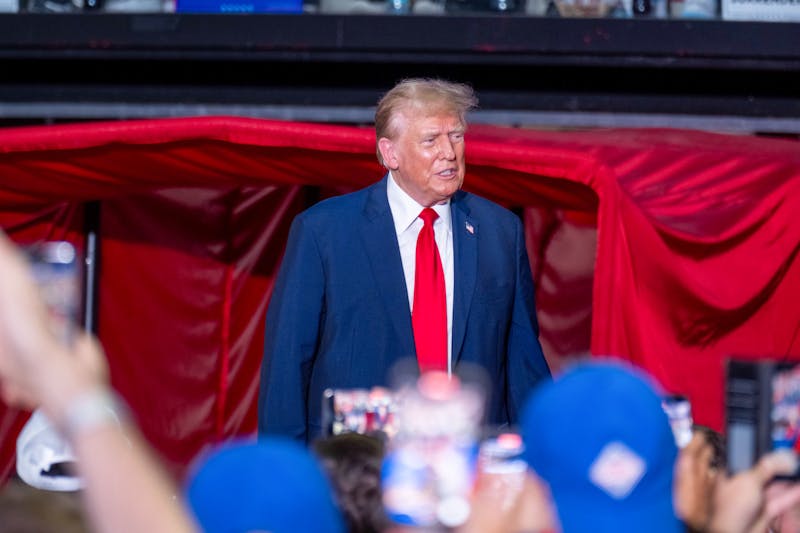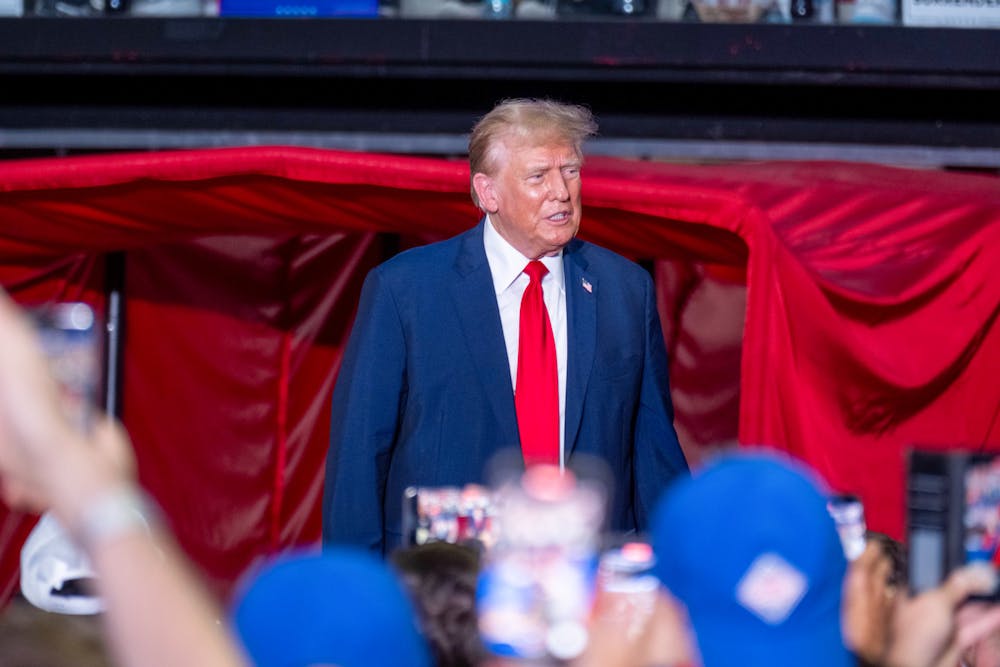President and 1968 Wharton graduate Donald Trump during his campaign rally on June 22, 2024.
Credit: Abhiram Juvvadi
Exhibits in Old City’s Independence National Historical Park are under review following an executive order signed by 1968 Wharton graduate and President Donald Trump in March.
The order — titled “Restoring Truth and Sanity to American History” — called for the restoration of federal parks, monuments, and statues that have been altered or removed since Jan. 1, 2020 “to perpetuate a false reconstruction of American history.” It further instructed museums and institutions to remove descriptions or depictions that “inappropriately disparage Americans past or living.”
In May, the Interior Department expanded on the executive order with a secretarial order which required all changes and upgrades to be completed by July 4, 2026 — the 250th anniversary of the Declaration of Independence. The order also instructed parks to collect public feedback through QR codes included in their signage.
In a statement to The Daily Pennsylvanian, an INHP representative said that the park has “not been directed to remove or change any existing interpretive media in the park.”
However, in accordance with Section 5b and Section 6 of the Secretary’s order, the National Park Service is evaluating all public comments submitted via QR codes displayed throughout the park during this review period. These include “compliments on park programs and services, notes on maintenance needs, and suggestions for correcting potential inaccuracies or contextual imbalances,” according to the INHP representative.
The representative added that interpretive materials which “disproportionately emphasize negative aspects of U.S. history or historical figures” without acknowledging broader context or national progress can “unintentionally distort understanding rather than enrich it.”
According to The New York Times, the INHP exhibits that have been currently marked to be reviewed are a panel at the Liberty Bell, the President’s House outdoor exhibit, and displays acknowledging the federal government’s relationship with Native American tribes.
With over three million people visiting annually, INHP is among the most prominent historic sites in the country, housing both Independence Hall and the Liberty Bell. Trump’s executive order claims that the prior administration sponsored training by an organization that supports dismantling “Western foundations” and “interrogating institutional racism” — adding that this “corrosive ideology” must be abolished.
This effort to alter existing exhibitions has raised concerns from the Philadelphia community.
Penn communications professor Michael Carpini said the order is an attempt to “create an image of the country as if it has no blemishes.”
“The proximate cause is that the Trump administration is trying to eliminate any or most references to diversity and the more troubled parts of American history,” Carpini said.
He emphasized that the Trump administration is using its power to “intimidate institutions.”
“What you see happening is this vicious circle in which the Trump administration is going after a variety of different types of institutions, in the false hope that they might be able to avoid some of his worst wrath,” Carpini added.
Throughout the past year, the Trump administration has similarly been targeting diversity, equity, and inclusion efforts at Penn, demanding that its schools scrub references to these initiatives.
Carpini noted that INHP is a target of the Trump administration because it is a “major source” of the way that people think and learn about history.
Sign up for our newsletter
Get our newsletter, DP Daybreak, delivered to your inbox every weekday morning.
“It’s one of the reasons why they’re going after higher education like Penn,” Carpini said. “Those are the places that really are holders of information, educators and trainers of the citizenship of the next generation.”
Carpini warned that even small edits to cultural organizations can result in large impacts on the nation’s civic memory. He expressed concern that as visitors view the exhibits in “their new, sanitized version,” they may not recognize that the sight reflects any “controversy.”
“They may not know that there was an alternative way of thinking about this history, and they will be suddenly socialized to a vision of American politics that erases the history of a large segment of our population and problematic nature of the things we’ve done as a country,” Carpini said.
The Daily Pennsylvanian is an independent, student-run newspaper. Please consider making a donation to support the coverage that shapes the University. Your generosity ensures a future of strong journalism at Penn.

